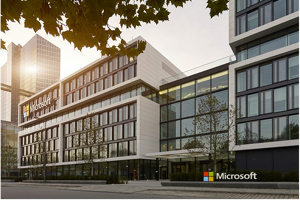Rudolf Diesel reception at the Microsoft Germany headquarters with technology forum on artificial intelligence
Festive Rudolf Diesel reception on the occasion of the awarding of the Rudolf Diesel medals on April 12, 2019 at Microsoft’s Germany headquarters in Munich-Schwabing. Over 200 guests from the innovation community celebrated this year’s awarding of the oldest innovation award in Germany with the winners of the Rudolf Diesel Medal. At this suitable place for innovation and innovative ideas, offices could be visited that function as an open platform and interdisciplinary laboratory for the best ideas. At the technology forum, Microsoft showed ready-made services for creating AI applications, an optimized infrastructure for AI applications and suitable tools for AI projects.
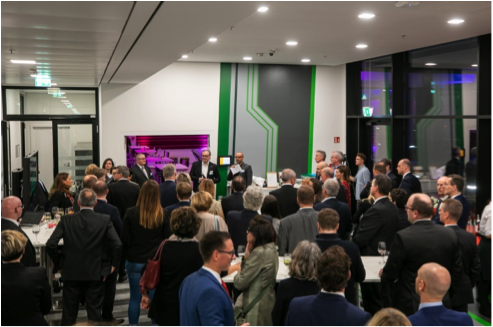 The Rudolf Diesel medals in the categories of the best innovation and the most sustainable innovation, which this year was awarded to Klaus Eisert from Phoenix Contact and Manfred Wittenstein from the family company Wittenstein SE, are considered a lifetime achievement award. At the Rudolf Diesel reception, past achievements meet future opportunities, says Prof. Alexander Wurzer, spokesman for the Diesel Board of Trustees. The reception took place at the invitation of Mr. Andre Kiehne, who, as the Segment Lead Specialist Sales, is responsible for the solution business at Microsoft Germany. His division was created by the technology provider from Seattle to support Microsoft customers at their digital transformation with technical know-how.
The Rudolf Diesel medals in the categories of the best innovation and the most sustainable innovation, which this year was awarded to Klaus Eisert from Phoenix Contact and Manfred Wittenstein from the family company Wittenstein SE, are considered a lifetime achievement award. At the Rudolf Diesel reception, past achievements meet future opportunities, says Prof. Alexander Wurzer, spokesman for the Diesel Board of Trustees. The reception took place at the invitation of Mr. Andre Kiehne, who, as the Segment Lead Specialist Sales, is responsible for the solution business at Microsoft Germany. His division was created by the technology provider from Seattle to support Microsoft customers at their digital transformation with technical know-how.
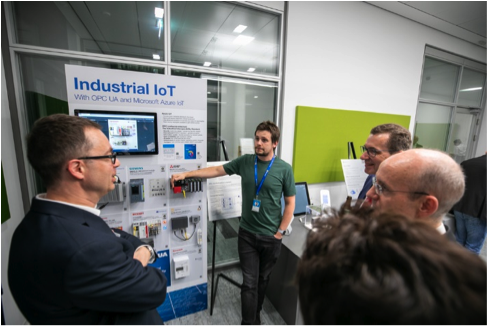 Microsoft provides mature, “ready-to-use” services through its AI platform, with which developers can quickly create solutions based on artificial intelligence. Intelligent applications that are tailored to the requirements, security and compliance of the company can be developed with it. Microsoft’s AI services offer support in various areas such as machine learning, speech and text recognition and many more. AI is a machine’s ability to mimic intelligent human behavior. AI enables machines to analyze images, understand language, interact naturally, and make predictions based on data.
Microsoft provides mature, “ready-to-use” services through its AI platform, with which developers can quickly create solutions based on artificial intelligence. Intelligent applications that are tailored to the requirements, security and compliance of the company can be developed with it. Microsoft’s AI services offer support in various areas such as machine learning, speech and text recognition and many more. AI is a machine’s ability to mimic intelligent human behavior. AI enables machines to analyze images, understand language, interact naturally, and make predictions based on data.
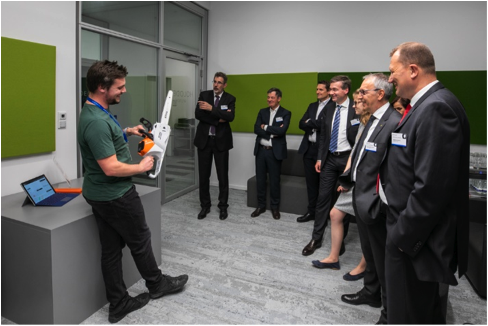 Typical current applications of AI were presented at the technology forum. With “Knowledge Mining” hidden knowledge in content can be identified. Such content can be documents, images or media. Search services with AI functionality can discover patterns and relationships in the content, understand moods and extract key words. Microsoft also offers machine learning functions on its Azure platform. In this way, machine learning models can be created, trained and implemented.
Typical current applications of AI were presented at the technology forum. With “Knowledge Mining” hidden knowledge in content can be identified. Such content can be documents, images or media. Search services with AI functionality can discover patterns and relationships in the content, understand moods and extract key words. Microsoft also offers machine learning functions on its Azure platform. In this way, machine learning models can be created, trained and implemented.
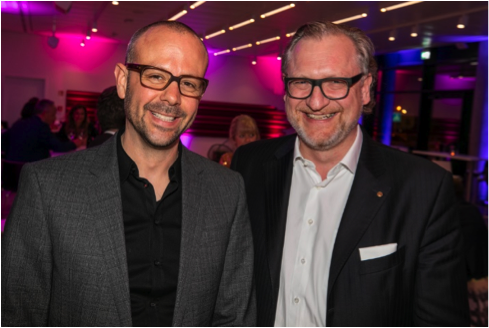
At the same time the AI day at Microsoft took place under the headline “Disrupt or be disrupted”. As trite as it looks, the more topical it is. Because those who are still market leaders today can be replaced tomorrow. Innovation and progress do not only come about through the pure application of technologies. Rather, companies have to develop their own digital skills in order to become providers of digital solutions themselves. One topic that currently concerns corporate decision-makers, developers, IT specialists and many more is artificial intelligence (AI), because hardly any other technology is more disruptive.
A recent Microsoft study shows that fast-growing companies rely on artificial intelligence more than twice as often as companies with low growth. High-growth companies are more likely to use algorithms and machine learning to help them make decisions, optimize their machine runtimes and production processes or develop completely new business models based on data. However, the study also shows that AI is often only used selectively and is only rarely integrated into all processes. So that all companies can benefit from the opportunities offered by technologies such as artificial intelligence, Microsoft is helping to make customers and partners fit for AI.

